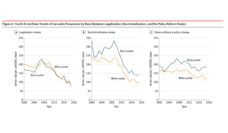Cannabis remains federally illegal for possession, distribution, and cultivation, and is a major cause of arrest in the United States. Cannabis criminalization disproportionately harms Black people since they are more likely than Whites to be arrested for possession. This contact with the justice system harms health, social, and economic outcomes.
State-level cannabis decriminalization and legalization can prevent entanglement with the justice system. Expungement, meaning the destruction or sealing of criminal records, can eliminate stigma and social and legal sanctions. It has also been shown to lower recidivism, increase earnings, and increase access to work, housing, and education. Forty-five states and Washington DC allow some degree of expungement, yet this option is relatively underused. Prior research shows that this underuse is largely driven by a lack of awareness, the complexity of navigating the process, and regulatory and financial hurdles.
We conducted a retrospective survey of expungement laws for the 39 states and Washington DC that had decriminalized or legalized cannabis as of September 2022 using statutes found from government websites or via the NexisUni database. We assessed whether they allowed cannabis record expungement via general offense expungement programs, programs specific to drug offenses, programs specific to cannabis offenses, or through multiple programs. We also explored whether expungement was automatic or if individuals had to file petitions. Lastly, we assessed whether there were waiting periods delaying expungement, or financial requirements, mainly in the form of filing fees or previously mandated fines or restitution.
Thirty-five states and Washington DC offered expungement. Thirty-four offer it for offenses generally, including cannabis. Of these, 33 required record holders submit a petition, 9 automatically expunged records, and 8 used both processes. Seven states used pardons, meaning a governor or body had to excuse the offense, to provide relief. Among the 21 cannabis-specific programs, 17 used petitions, 9 expunged automatically, 5 required pardons, and 7 provided multiple methods.
Thirty-three of the 36 state governments offering general expungement required waiting periods after a relevant or the most recent offense before initiating expungement. The most common waits were 1-2 years (10 total), 2-5 years (28 total), and 10 or more years (17 total). Five established waiting periods for automated expungement.
Seven governments set waiting periods for cannabis expungement programs. Six set waits for petition expungement, ranging from no wait to 4 years. Three with automated expungement established waits of 1-2 years or tied waits to offense date.
Nineteen of 34 states offering general expungement required fees. Nine of those offered indigency waivers, one reimbursed fees upon expungement, and another waived fees upon diversion program participation. Two charged no fees for decriminalized offenses.
Only 4 of the 21 governments with cannabis-specific programs required payment of fees. Seventeen required payment of court-ordered fines and/or restitution to victims of non-specific or specific amounts established by states related to offense type or individual cases. Sixteen general offense programs and one cannabis-specific program required payment of outstanding financial judgments, legal obligations, and/or restitution. Four states provided alternatives to payment.
Most governments surveyed required record holders to submit petitions, and established waiting periods and financial barriers that made expungement prohibitive. Petitions require navigating complex procedures that consume time and resources, likely contributing to low uptake. In addition, long waiting periods create a psychological hurdle while sustaining stress related to criminal record stigma and penalties, and fees increase costs to individuals or require them to navigate indigency waiver processes. Reducing these administrative burdens has historically increased expungement. Previous research suggests that states should explore automation to reduce barriers and increase uptake.
Our findings suggest that current expungement systems fail to provide clearance and associated economic and social relief for people with cannabis-related records, and states should consider automation to expand clearance.
Photo via Getty Images














